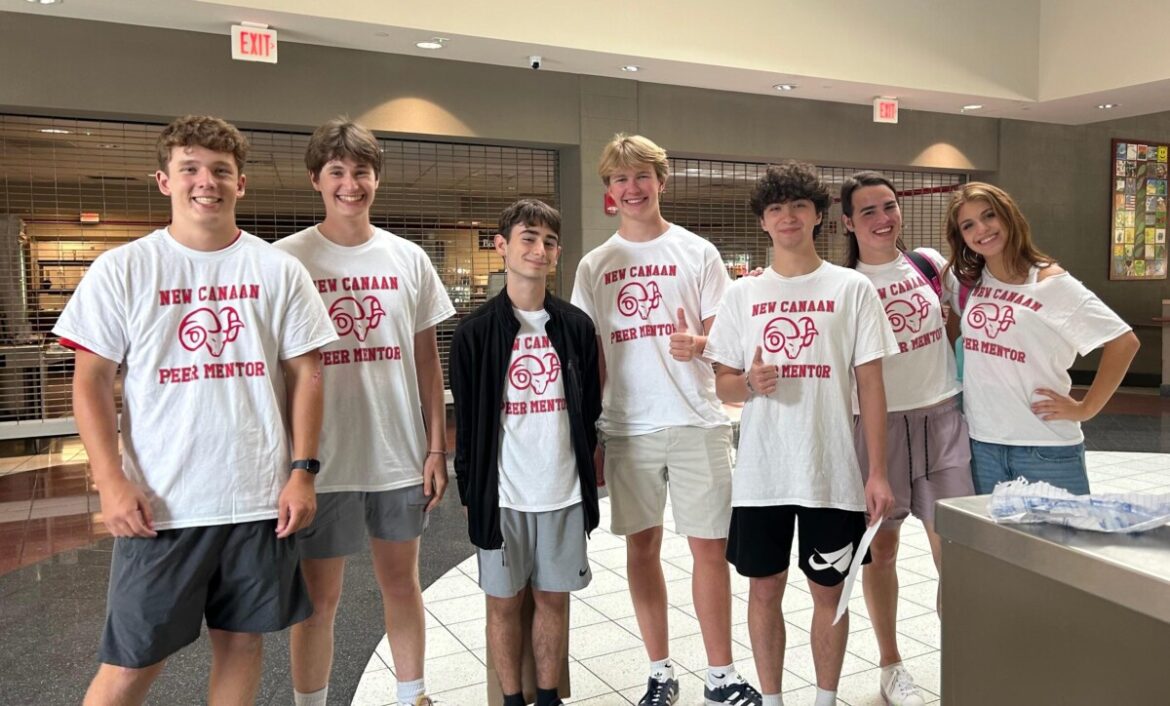Luke Huang, Features Editor
@lukehcourant
As the new school year kicks off, seniors at the high school are stepping up to mentor their freshman counterparts in a big way. As part of the Peer Mentor Program, over 30 senior peer mentors guide the freshmen in their transition to high school, from navigating nuances like accessing Schoology to diving into more pivotal experiences such as participating in afterschool activities.
Peer Mentor Program Director and ACES Teacher Nancy Stevens began the program last year to help first-year students acclimate academically as well as socially to the high school. During the connections blocks last year, peer mentors met with their freshman groups to help them with everything from technology integration and guidance meetings to absence policies and grading. Since then, the Peer Mentor program has grown from 25 to 32 peer mentors, with each overseeing from 8 to 11 students.

Quentin Pearl, a senior peer mentor, decided to volunteer after reflecting on his own challenges acclimating to high school as a freshman. “The high school is an entirely new experience. When we were here as freshmen, we didn’t have anybody to help us change from Google Classroom to Schoology,” he said. “With basic stuff like that, there weren’t people to help you. It helps to have a group of mentors help the freshmen if they have any problems.”
The application and training process has remained largely the same, according to Ms. Stevens. Each Peer Mentor was selected based on a holistic approach involving a questionnaire about each student’s strengths, weaknesses, and enthusiasm for helping younger students.
Afterward, accepted students underwent an hours-long training session. “We came in one day for two hours, and Ms. Stevens went through how to handle different situations if they need help and also upcoming events, such as freshman orientation or freshman day,” Quentin said.
Based on the feedback at the end of last year, the Peer Mentor Program has had some changes when compared to the previous year. “I did exit interviews with the seniors who were graduating, and just took some of their feedback and made sure to highlight some of the things they mentioned,” Ms. Stevens said. “We are applying the feedback from last year’s seniors, but the format is the same.”
For instance, Senior Peer Mentors began right at the beginning with the freshman orientation, in contrast to waiting for connections block like the year before. “It was a little hectic, but they were listening well. We help them find different classrooms, set up with Schoology, and engage with their counselor,” Quentin said. “It’s really about guiding them as they go if they have any questions.”

Sophomore Soraya Breed, a freshman mentee last year, described the importance of having a peer mentor, especially in the beginning. “The first few days, I was confused about where my classes were and who my teachers were,” Soraya said. “My peer mentor Lauren helped me find those classes.”
Other than acclimating to the academic rigor, senior peer mentors have been helpful socially. As Soraya recalls, her peer mentor was a friendly face in the halls, especially in a school of strangers. “We smiled and waved to each other in the hallway,” Soraya said. “And it felt cool waving to a senior.”
It’s also crucial for freshmen to know that their peer mentor is an available resource for joining social activities like clubs to better acclimate to high school. “With things like how to get into football games, they feel more comfortable asking another student,” Ms. Stevens said. “Honestly, sometimes the students know the answer more than the adults.”
Looking ahead, Ms. Stevens sees potential in transitioning from the Connections block to the Community block. While the new changes mean designated blocks for senior peer mentors to meet with their freshmen will occur less often, they can shift to the new possibilities.
One of the things peer mentors are encouraged to do is to have an informal meeting with their freshmen, either meeting for lunch, a check-in before school, or even one-on-one time. “We’re hoping for quality over quantity,” Ms. Stevens said. ”Sometimes those informal gatherings in school are where the deeper conversations can take place.”

As the year progresses and freshman events and the freshman counselor meetings start, they will help drive the Peer Mentor Program’s goals for the later part of the year. “We put in the planning stages for the second semester to make the experience better for everyone,” Ms. Stevens said. “We’ll have the time to do more participatory events at the end of the year things as things get a little crazy. But that is something that we would like to do going forward.”
According to Ms. Stevens, as mentors guide their freshmen to find their interests and pursue them, the mentor-mentee relationship has gone both ways. “It’s been a win-win for both,” Ms. Stevens said. “But as the year went on, it’s been worthwhile.”
Regardless, the peer mentor will surely be a staple of the high school. Some underclassmen are already interested in being senior peer mentors. “The first day of school, I was looking for freshmen to help because I knew just how crazy and chaotic the hallways can be,” Soraya said. “I remember what it’s like, and I’d want to be a senior peer mentor.”




